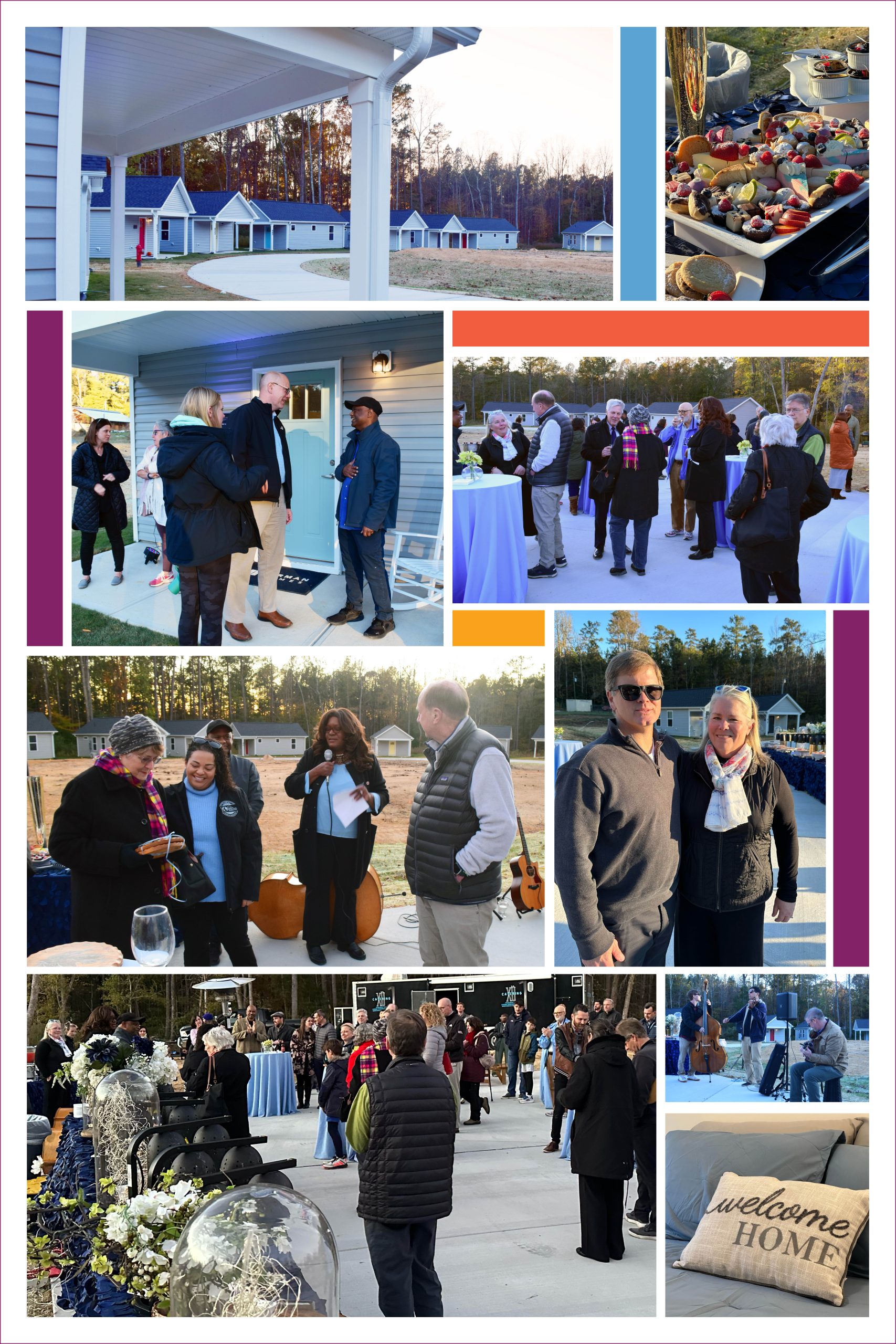by Barbara Wiedemann
Under a waning moon on a chilly Nov. 2 evening, bundled-up friends of the Tiny Homes Village gathered at a 40-acre farm eight miles southwest of campus for an off-site event hosted by the University of North Carolina at Chapel Hill School of Social Work.
“We all know housing is health care, and this is especially true for individuals with serious mental illness,” said guest Dr. Carrie Brown, chief psychiatrist at NCDHHS. “This tiny home community is a shining example of true whole person health.”
Nearly 75 guests enjoyed live music and dined under the stars while touring 15 permanent homes built for an average of $50,000 a home. Each “tiny home” at The Farm on Penny Lane in Chatham County, N.C., is 416-square-foot in size. The permanent residences were designed for people living with mental illnesses and veterans living on a fixed income. Residents will receive permanent support including wraparound medical, behavioral and social support on-site and affordable housing designed to help them live with dignity and privacy.
The $3.2 million public-private partnership between the nonprofit Cross Disability Services, Inc. (XDS, Inc.) and the School came to fruition powered by data, hope and hard work.
“We all know housing is health care, and this is especially true for individuals with serious mental illness. This tiny home community is a shining example of true whole person health.”— Dr. Carrie Brown, chief psychiatrist at NCDHHS
Many people with mental illnesses rely on Supplemental Security Income to provide the support they need to live in the community. In 2023, that support comes to $914 a month.
“You can’t even afford a one-bedroom apartment for under $1,300 anymore. Then you’ve got to pay for food, medication, utilities. How do you do that?” Tiny-Home Village Co-Director Thava Mahadevan asked in February.
At the conceptual stage of the project, the partnership solicited feedback from people with mental illness and service providers on how to design the tiny homes and surrounding community to best meet future residents’ needs. The results of the evaluation were used to inform the design of the Tiny Homes Village.
Proof-of-concept affordable housing

“We are here to give honor where honor is due,” Dean Ramona Denby-Brinson pointed out as she discussed the team effort behind the creation of the 15 independent homes tucked around a circle behind an organic garden.
“When they say that we are a University that serves the people in our neighborhoods, this is it. This is implementation. This is practice. This is how we translate the work that matters for people that matter.”
She referenced the partnership’s long-term vision, first supported with great enthusiasm by former Dean Gary Bowen, of a demonstration project built to address a dire local need — but just as importantly, built to act as a “proof of concept” that tiny homes can be used as well-designed, affordable, permanent housing to support the health and well-being of people with mental illness in other communities around the state and indeed, across the nation.
“We moved a lot of dirt to get here,” said self-described “focuser” and Tiny Homes Co-Director Amy Blank Wilson, an associate professor at the School.
Wilson listed just some of the collaborative efforts with 30 different partners since the March 2020 groundbreaking, including rezoning land, widening the lane, bringing public water and a septic system to the site, establishing drainage and paving the circle. And lastly, framing up and building out 15 functional, livable homes for a total of $750,000.
“Everyone’s lives are touched by mental illness,” Wilson said as she recounted the driving forces behind the project, “and hope is a powerful and illusive medicine.”
She acknowledged dozens of community partners, particularly Mahadevan, CEO of XDS and the director of operations at the UNC Center for Excellence in Community Mental Health; project coordinator Jamie Swaine — “the organizer” — and project manager and “connector” Lee Bowman of The Legion Company.
People need a place and a purpose
“We can have the best medicine in the world, we can have the best hospitals in the world,” added Mahadevan, “but people really need a place and purpose. I feel this place will offer that.”
Organizers also recognized meaningful supporters like the Oak Foundation, whose groundbreaking $1 million leadership grant enabled Tiny Homes Village partners to prepare the site and funded three homes; NC State University’s College of Design students, who designed and built the tiny home village’s spacious open-air pavilion two summers ago; Garman Homes, who “stood up” 15 homes in 96 days on time and under budget earlier this year; and longtime School of Social Work philanthropists Peter and Prudence “Prue” Meehan, Dan and Anita McClernon and Carolina graduates Tom and Larry Hines — each couple generously sponsored the full cost of a home now named in their honor.
What’s next
Each home will rent for around a third of a resident’s income a month and veterans will be given priority for five of the homes.
Several giving opportunities remain. Homes are ready to be outfitted with everything from shower curtains to kitchen utensils; sheet sets to a full set of furnishings.
One special donor is being sought to provide the $500,000 needed to build the village’s Community House, a central gathering place just off the circle of homes that will be built as a multipurpose laundry facility, activity center and more.
UNC School of Social Work Associate Dean for Advancement Kandace Farrar and her team are ready to answer any questions at kandace_farrar@unc.edu. Online gifts for Tiny Homes are accepted at this link.

